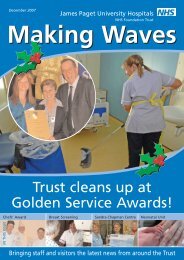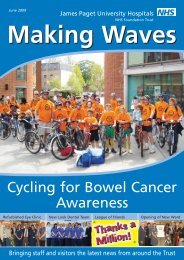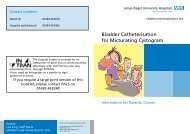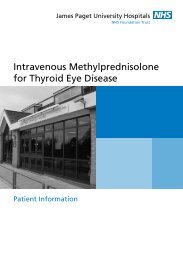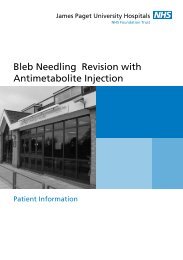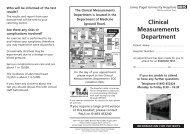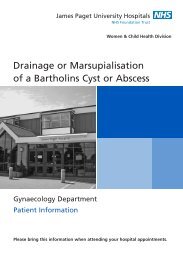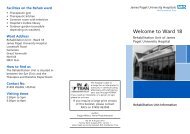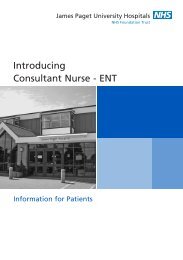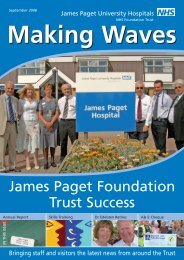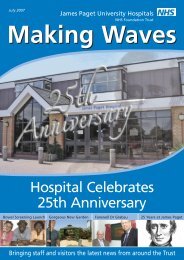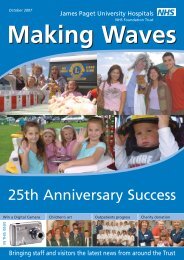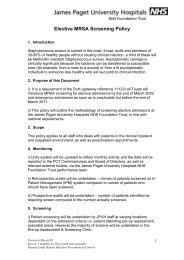Making Waves June 2011 - James Paget University Hospitals
Making Waves June 2011 - James Paget University Hospitals
Making Waves June 2011 - James Paget University Hospitals
You also want an ePaper? Increase the reach of your titles
YUMPU automatically turns print PDFs into web optimized ePapers that Google loves.
News<br />
Letter from New Zealand -<br />
Hi from Guy Vautier<br />
Leaving the UK at the end of the December seems a long time ago and our<br />
only struggle with our move to New Zealand has been with the accent.<br />
“So we need a license<br />
for having a hole dug in<br />
our garden?” replied Kate,<br />
“No, for your domestic pit!”<br />
an exasperated lady at the<br />
local council implored, “Your<br />
DOG” she affirmed. “I’m so<br />
sorry” said Kate “I thought<br />
you said pit, not pet….”<br />
We arrived in Napier on<br />
a bright Sunday morning,<br />
met by the head of medical<br />
personnel. One thing I<br />
am learning is the depth<br />
of welcome afforded to<br />
us. Being a foreigner is a<br />
very enlightening way of<br />
reflecting upon one’s own<br />
attitudes towards others.<br />
That stated the hospital<br />
here relies heavily upon the<br />
UK and South Africa for its<br />
medical and nursing teams,<br />
so at work it is very much<br />
like being a foreigner among<br />
foreigners.<br />
Obviously, the significant<br />
event since our arrival<br />
has been the earthquake<br />
in Christchurch, but now<br />
the devastation in Japan<br />
seems to pale this into<br />
insignificance! For New<br />
Zealand imagine the third<br />
largest city in the UK (i.e.<br />
Birmingham) being hit by<br />
an event that took out<br />
most of its infrastructure<br />
and killed hundreds and<br />
injured thousands – that is<br />
the national scale of things.<br />
However, with a pragmatism<br />
not seen in northern Europe<br />
the country has gathered<br />
together to help support<br />
Christchurch and Canterbury.<br />
The response has been<br />
not to flood the city with<br />
lots of people that the city<br />
cannot support, rather it has<br />
evacuated the vulnerable,<br />
and encouraged those that<br />
can move out to do so;<br />
the country can support<br />
these people while the city<br />
rebuilds itself.<br />
I keep making the<br />
observation that as far as<br />
healthcare is concerned<br />
the problems are the<br />
same, things are just done<br />
differently. It is only when<br />
one steps away from the<br />
NHS that you see how good<br />
the system is. The New<br />
Zealand one is a good public<br />
care system, however access<br />
is frustrating and it reminds<br />
me of the<br />
long waiting<br />
times that<br />
people<br />
in the UK<br />
struggled<br />
with some<br />
10 or 15 years ago. The<br />
New Zealand government<br />
and people accept the reality<br />
of rationing more openly.<br />
Treatments are limited only<br />
to those with clearly proven<br />
benefit. The UK has come<br />
a long way with respect to<br />
cancer care. I know how<br />
much I was against the<br />
blanket two week wait<br />
policy but ten years down<br />
the line, with everyone<br />
putting in an effort,<br />
individuals do receive timely<br />
care.<br />
Inwardly I giggle as I see<br />
the organisation getting<br />
its head around drug<br />
reconciliation, unifying IT<br />
systems, being nationally<br />
compliant, prevention of<br />
deep vein thrombosis and<br />
trying to get documentation<br />
sorted. My principle criticism<br />
is that New Zealand is<br />
dealing with health issues<br />
New Learning Disabilities Liaison Nurse<br />
that<br />
the NHS faced a few years<br />
ago. However, the very<br />
positive thing is in dealing<br />
with these issues they watch<br />
the mistakes made by others<br />
and ensure they learn by<br />
them.<br />
The biggest plus has<br />
definitely been more time:<br />
more time to spend with<br />
each person for whom I care;<br />
more time with the same<br />
junior doctors; more time to<br />
talk with the nursing team<br />
and most importantly more<br />
time with Kate and the boys.<br />
Last week I had a<br />
morning free so Kate and<br />
I went for a lovely walk<br />
around the stunningly<br />
beautiful Te Mata peak.<br />
This is the luxury that<br />
moving half way round the<br />
world has afforded us and<br />
for which, so far, we are<br />
thoroughly enjoying.<br />
Rebecca Crossley has been appointed to the role of acute liaison nurse for learning disabilities. She offers direct support<br />
to patients, users and carers and provides education and training for front-line staff, to increase awareness of the needs<br />
of learning disability patients and how to adapt and plan care for them.<br />
Rebecca’s role is to work closely with her colleagues in primary care, to help patients who are coming in for planned<br />
appointments and procedures, preparing them for their hospital stay and making their experience less stressful.<br />
Rebecca is taking on the challenge of establishing her new role and making sure staff across the hospital know<br />
she is there to be called upon. She is working closely with the community Learning Disability teams, advocacy service,<br />
carers groups and GPs in the community so there is streamlined handover of patients and the opportunity to highlight<br />
individual needs early on, as well as working through sometimes complex discharge arrangements to avoid hold ups.<br />
Rebecca is now a member of the Learning Disabilities Liaison Nurse Network and Partnership board sub-groups,<br />
where staff from partner organisations, advocacy groups, carers, service users and support agencies<br />
are working to develop effective admission pathways and guidelines; ensuring that services can<br />
remain flexible and meet the needs of the user.<br />
Rebecca said: “Learning disability patients in the community have special needs and requirements<br />
so it follows that when they come to hospital they will also need extra help and input. It’s not only<br />
clinical support at the bedside, along with education and training; but also about providing equal<br />
access to healthcare; helping to meet patients’ special needs. For some patients even getting them<br />
into hospital in the first instance can be a major achievement.”<br />
If your area has not yet received Learning Disability awareness training please don’t hesitate to<br />
contact her.<br />
Telephone: 01493 453732 Bleep: 1868 E-mail: rebecca.crossley@jpaget.nhs.uk<br />
www.jpaget.nhs.uk <strong>Making</strong> <strong>Waves</strong> Newsletter <strong>June</strong> <strong>2011</strong> Page 11



